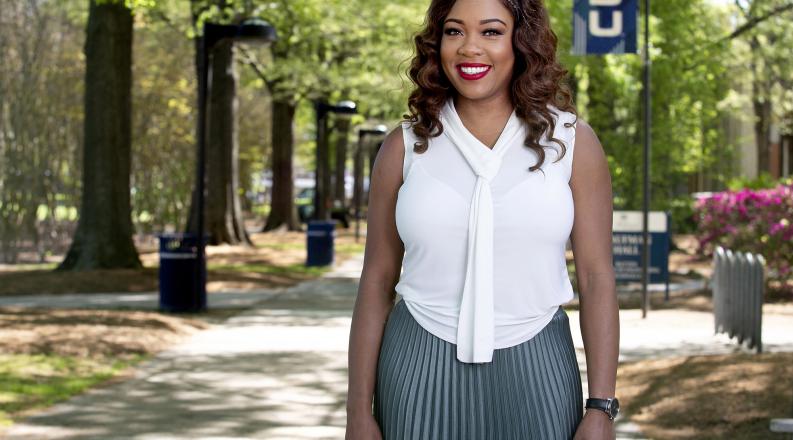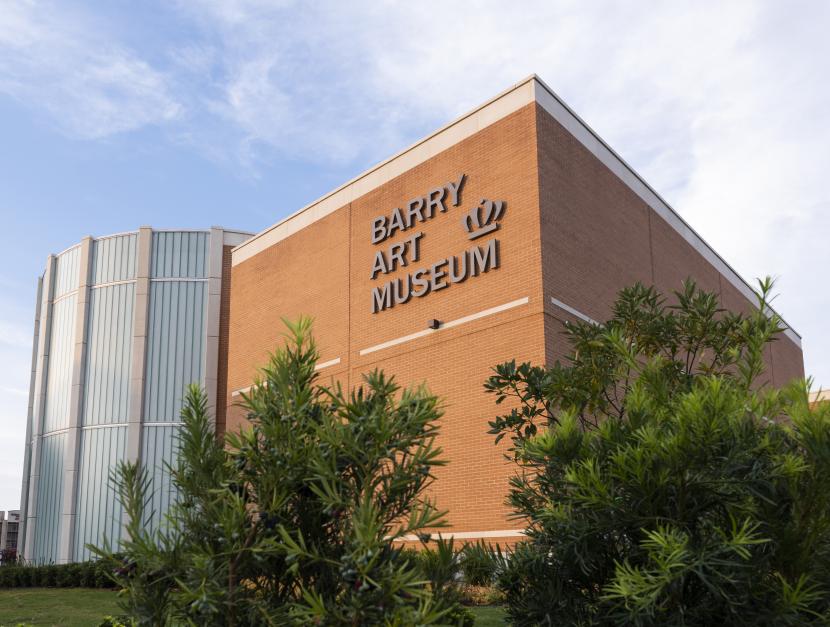By Sherry DiBari
When it comes to equitable public health-care policies and decisions, Tashique Thomas wants everyone to have a seat at the table.
"What I'm most passionate about is ensuring that there is representation of women, Black women, veterans, LGBTQ+, immigrants, working women and mothers," she said. "I think it's important to me, for us, to be represented in spaces that influence the decisions that have an impact on us."
Thomas, a Navy veteran experienced in hands-on public health, and a cohort of Old Dominion University's inaugural masters of public health class, is motivated to help provide that representation.
When Thomas moved to the United States from her native Jamaica 10 years ago, it took time for her to get used to the culture.
"Jamaica is a bit more relaxed, and people are comfortable with less," she said. "What I've noticed with American culture is that when you achieve one thing, if you pay off your car for example, you are already looking to get another one. It was a bit of a culture shock."
Thomas, the first in her immediate family to graduate from college, felt education was her opportunity to break generational boundaries.
"That was my way, or that for my family and my ancestors, to break barriers and be represented in areas that are not traditional or reach goals that may not have been achievable or attainable 10 or 20 years ago," she said.
After earning her first bachelor's degree in mass communication from Northern Caribbean University, Thomas joined the Navy.
She was assigned to the U.S.S. Princeton as a hospital corpsman, a placement that quickly introduced her to all aspects of public health.
Thomas' duties had her dealing with hearing issues among crew members created by ship noise, water and food safety testing, health screenings, environmental compliance checks and promoting healthy behavior among the crew.
"That kind of prompted my interest in public health," she said. "Every aspect of health and public health was our responsibility."
Thomas' next role led her to the Balboa Medical Center, where she worked as a medical and administrative officer during an influenza vaccine rollout.
"That gave me another look into a different area of public health with inoculations and deployability and readiness for the military," she said. "With about 60 different commands and about 400,000 people getting vaccinated, setting that up from start to finish on a mass vaccination."
Thomas then transitioned to Portsmouth Naval Hospital's Preventative Medicine Department, where she was in charge of disease management, infectious diseases and the HIV and sexually transmitted disease program.
When Thomas decided to go back to school for her master's degree, ODU, just across the river from Portsmouth, seemed like the perfect fit.
And, they had just rolled out a master's program in public health.
"I was interested in being a part of history in the first M.P.H. cohort class," she said. "It was exciting to be a part of that."
In the classroom, Thomas was able to use skills that she picked up in the Navy.
"I think being in the military, the environments that I've been in, have empowered me to lead and take charge of what I see needs to happen," she said. "While I've been a student here, I found myself being in that role a lot."
Thomas also volunteers with the Virginia Medical Reserve Corps and has been active with regional public-health ventures.
In December, Thomas transitioned out of the military for a new role as a national strategic solution director with United Healthcare.
"It's another gratifying role where I get to influence on a higher level how we serve members in various markets nationally and what that looks like for population health, social determinants of health, racial equity, health equity and just overall health outcomes for marginalized or low-income individuals," she said.
For Thomas, the hardest part of her educational journey has been the lack of time. "The balance of being a wife, and having a family, working full time and doing school full time is my biggest challenge," she said.
She will finally have some free time after graduation.
"I'm looking forward to it," she said. "I have gotten some roller skates recently to pick up a new hobby. So, I think I'll try to figure out how to skate."
And Thomas is thinking about another transition: law school.
"It was actually Dr. (Mike) Palmer, my professor for environmental health law, that really influenced what I wanted to do next," she said. "Capt. Palmer gave me the motivation and painted the picture that this was achievable for someone who didn't have a criminal justice background to go into law. He's the one that really showed me that this is possible.
"I want to have the opportunity to influence legislative or policymaking decisions when it comes to health, health care for marginalized or low-income individuals, since they are the most vulnerable and usually don't have a seat at the table."






